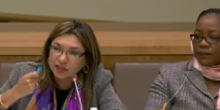Legal frameworks key to responsible agriculture investments
Agriculture is the most important economic activity in Guatemala, employing around 32 per cent of the country’s labor force and contributing 14 per c

Almost two decades since the 1996 peace accords that brought an end to the 36-year-long civil war in Guatemala, justice for wartime atrocities remains elusive. And social inequality is still widespread.
Indigenous – mainly Mayan – communities are disproportionately affected by poverty, and frequently involved in disputes over ancestral lands.
As part of a program on legal preparedness for climate change, IDLO has analyzed the Guatemalan legal framework, focusing on carbon rights and how related activities could reduce conflicts and benefit rural and indigenous communities. The IDLO legal preparedness initiative spans four countries in Latin America.
Agriculture is the most important economic activity in Guatemala, employing around 32 per cent of the country’s labor force and contributing 14 per c
Antigua Guatemala, 17 May 2018
In 2016, the United Nations Food and Agriculture Organization (FAO) launched a needs-driven Umbrella Programme to enhance responsible investment in agriculture and food systems with a view to addressing the global challenges of food security and hunger, particularly in low income countries. The work includes support for the application of guidance instruments such as the Principles for Responsible Investment in Agriculture and Food Systems (CFS-RAI), endorsed by the Committee on World Food Security in 2014.
The agricultural sector in low income countries has suffered from serious underinvestment for decades, with considerable consequences for long-term food security. The investment needed to eradicate hunger by 2030 has been estimated at US$1.5 billion annual additional investments per year, of which US$276 million is required for rural development and agriculture.

More than thirty representatives of civil society, human rights groups and international organizations attended an IDLO conference in Colombia, this week, on strengthening and expanding legal services available to people living with HIV and other key population groups in Latin America.

Representatives from government, civil society and the private sector gathered in New York at the United Nations to discuss the importance of promoting equal participation of women in international positions of authority to promote sustainable development.

Languages: English, Español
IDLO facilitated a meeting held on January 25 - 27, with a focus on strengthening HIV-related legal services in Latin America through regional alliances.
With support from the Ford Foundation, IDLO hosted a Latin American regional meeting on best practices in the provision of HIV-related legal services.